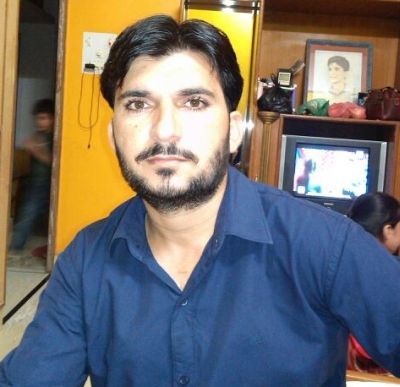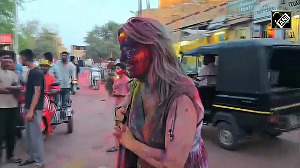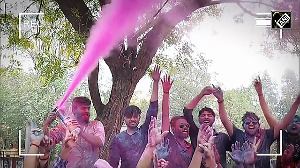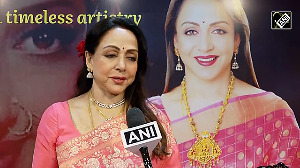'We realised that the government and police were shielding the Dera chief.'
'From 2002 to now, irrespective of which political party, the Dera has always been protected.'

A special Central Bureau of Investigation court on August 28 sentenced Dera Sacha Sauda chief Gurmeet Ram Rahim Singh to 20 years in jail for rape of his two followers.
The court held Ram Rahim acted like a 'wild beast' who did not even spare his own 'pious' female disciples.
The court also said that Ram Rahim, 50, committed breach of gravest nature by sexually assaulting 'such gullible and blind followers' and that he did not deserve any leniency.
While the families of the women have expressed relief at the sentencing, justice would have been near impossible had it not been for Ram Chander Chhatrapati, editor of Poora Sach, a daily newspaper published from Sirsa.
Chhatrapati's decision to take on the Dera's might by publishing a letter that accused Ram Rahim of sexual assault and rape led to him being murdered outside his home in October 2002.
Fifteen years later, his son Anshul Chhatrapati, spoke of the vindication for his father and a measure of closure for his mother after the sentencing.
But it is just half the battle won. The CBI court is yet to deliver a verdict for his father's murder.
Anshul, below, tells Rediff.com's Swarupa Dutt why he will not let his father's sacrifice go in vain, and talks of the family's long, hard struggle to seek justice.
(We republish this feature as a special court in Panchkula on Thursday, January 17, 2019, will pronounce the quantum of sentence for Dera Sacha Sauda chief Gurmeet Ram Rahim Singh convicted in the murder of journalist Ramchander Chhatrapati. This feature was first published in 2017)
Did you expect a guilty verdict in the 2002 rape case against Gurmeet Ram Rahim?
Bilkul (totally).
We have been struggling, hoping, that those two women and in turn, my father, will get justice.
We have been keeping that hope alive for 15 years.
My father's sacrifice gave us the strength and the forbearance to stay on the path of justice.
We just followed in his footsteps, that's all.
We did despair of ever getting justice when we saw that the very administration, the very government, which is supposed to protect the weak and the marginalised, were in fact protecting these frauds.
What gave us even strength was the strength of so many people standing by us.
Whatever hope people have for justice is from the courts, and that's the route we took to get justice.
I want to salute the two women and the CBI which has taken this case to its conclusion despite all the challenges and hindrances before it.
I want to thank the CBI investigation officer, Satish Dagar, who took the case to its conclusion.
I want to thank the judiciary which delivered justice despite pressure from the Dera to forgo justice.
I salute them.
Are you happy with the quantum of sentence?
Yes, 20 years is good enough.
I respect and welcome the verdict. It proves nobody is above the law.
The Dera Sacha Sauda believed that they were a law unto themselves, but the law has shown that nobody is above it however mighty they believe themselves to be.
You were 21 when your father was shot. Do you remember what happened that day?
It was 2002, October 24. My mother had gone to her parents' place. I was at home with my younger brother and sister.
My father had just reached home, it was around 7.30 pm, and we were getting ready to have dinner in a bit.
Somebody called out to him and asked him to step out of the house.
When he went out, they shot him.
He was in hospital for 28 days and died as a result of his injuries.
We saw him being shot, because you could see clearly from inside the house.
All three of us were witnesses to the attack and gave evidence in court.
We ran out and raised an alarm. There were policemen within walking distance of our house and they caught one gunman.
If that shooter had not been caught, maybe nobody would have believed that the Dera was responsible.
Why was your father shot?
He was a journalist, the editor of Poora Sach.
In 2002 he received an anonymous letter from a sadhvi of the Dera Sacha Sauda who accused the Dera chief of sexually assaulting and raping them.
The three-page letter, written by a former sadhvi, was addressed to then prime minister Atal Bihari Vajpayee, the DGP of Haryana, the chief justice of the Punjab and Haryana high court.
The letter explained how the Dera chief was sexually exploiting his women followers at the sprawling Sirsa ashram 'to purify them'.
My father published the letter in the paper. He did not know then who the sadhvis were, just that he wanted to support them.
The threats began soon after.
The threats were from the Dera Sacha Sauda. I cannot name who issued the threats, because I don't know their names.
He was shot on October 24, 2002, he was hospitalised for 28 days and he passed away on November 21.
In the first few days, when my father was lucid, and had given his statement to the police, they did not think it necessary to record it before a magistrate.
My father had specifically mentioned that the Dera head was responsible for the attempt on his life, but the police erased it from his statement.
We realised, of course, that the government and the police were shielding the Dera chief.
From 2002 to now, irrespective of which political party, the Dera has always been protected.
The revolver the men who shot my father were caught with, belonged to the Dera manager, Kishen Lal.
The walkie-talkie they were caught with belonged to the Dera.
We moved the Punjab and Haryana high court saying that the conspiracy was hatched by the Dera Sacha Sauda head and that the police had shielded them.
We said a fair investigation had not been carried out and demanded a CBI investigation.
The high court ordered the CBI to register an FIR in the case on November 10, 2003.
The case has now moved from the high court to the Supreme Court and is now being heard by the CBI court.

Whose decision was it to pursue the case?
I was 21 then, but I had no experience in such matters. So it was a joint decision by my family.
Did your father ever say that he feared for his life after the letter was published?
Yes, he told my mother, his friends, his colleagues. And all of them kept warning him not to take the Dera on, not to write anything about them.
But my father said, 'I am on the side of the truth, I am fighting for the truth, I don't fear anyone, I will expose them'.
He said, 'I am a journalist, I will not compromise with my profession. 'Apni kalam chalana hai (we have to keep writing).'
He said he was willing to publish the Dera's side of the story, but apart from threats, they never approached him.
He said he had no personal enmity with them, but would not back down in fear.
In retrospect do you think your father made the right decision to publish the letter?
Yes, of course, he did the right thing.
Yes, he would have been alive had he not published the letter. But I believe that a so-called saint whose organisation was based on lies had to be exposed and my father chose to do it.
Someone had to do it.
He lost his life because of it, but the result is apparent for everyone to see.
If he hadn't done it, it is entirely possible that the Dera chief would have posed a bigger danger to society.
I am proud of his decision and I believe that instead of him stepping back, had the government who was protecting the Dera stood by my father, had the media supported my father, then maybe, just maybe, he wouldn't have lost his life.
Your father was the editor of Poora Sach. Are you running the newspaper now?
Yes and no.
I was running the paper after my father passed away, but we were forced to shut it in 2014.
There was immense pressure by the Dera and it broke our back.
Indirect pressure. Advertisers stopped ads; circulation dropped after hawkers were threatened not to distribute our paper.
It was impossible to continue running he paper and we had no option but to close it down.
Do you now have plans to revive the newspaper now?
Beshaq (Of course).
I feel invigorated to bring back the paper.
My father had ignited the flame to take on the Dera, I will keep that flame alive.
How difficult was it to continue fighting the case?
Very difficult. But we haven't been fighting this case alone.
We have a whole legal team doing it for us pro bono.
The Dera had financial power, the protection of the government, but we had people who believed in our cause, in the truth.
And that is what made the difference.
How many hearings have been there in the case?
The case moved from the high court to the Supreme Court and finally the CBI court.
I would say approximately, in the CBI court alone, there would be over 200 hearings.
In the Supreme Court and high court together maybe another 50 hearings.
The CBI court hearing our case is the same court that heard the rape cases against the Dera chief.
When do you expect a verdict?
I don't know, but the next hearing is on September 16. The arguments will be concluded soon.
From 2007, since the chargesheet was filed, and the evidence was being collected, the Dera has been very successful in delaying the proceedings, which is why it has taken so long.
What delaying tactics?
Excuses. Defence witnesses would not appear, the hearing would be postponed, their advocate would not be present.
It was a continuous, sustained effort to delay the hearings.
In 2014 the presentation of the evidence concluded.
The matter was lying pending in the high court for three years and was moved to the CBI court thereafter.
Did you ever want to withdraw the case in all these years?
Bilkul nahin (Never).
You see, this is also an ideological fight. There was never any question of withdrawing the case.
What you do now?
Since 2014, when the newspaper shut down, I went back to academics and finished my graduation.
I couldn't complete my graduation since our world turned upside down after my father's death.
I will now be pursuing a degree in law. We also have a small piece of agricultural land which I am looking after.
Financially how difficult has it been after your father's death?
We were able to survive only because of the earnings from the agricultural land.
The case is being fought by a battery of lawyers pro bono, which is a huge relief to us.
Did you come face to face with your father's alleged killers?
Yes, in court appearances. But I never spoke to them.
I did not want to make our case weak by speaking to them. I wanted to let the law take its course, but yes, it was difficult to come to terms with the fact that they had killed my father.
Have you met the victims?
Yes, I have.
When the chargesheet was filed, their families, who were members of the Dera, asked them to back down.
When the women refused, they were thrown out.
When they went back to their parents' homes, I went to meet them.
Their life was under constant threat so they went underground and I never met them thereafter.
So you offered support to them?
Yes, moral support. I salute those women.
They took on such a big organisation, the system which was supposed to protect them, did not. Yet they continued fighting.
Which will be a bigger victory? Ram Rahim's sentencing in the rape cases or the impending verdict in your father's murder case?
I don't think I can compare the two.
The cause for which my father gave his life, that verdict has come. It proves he was right.
People kept saying that Ram Rahim is incapable of the atrocities he has been charged with. That he is a guru. They have all been proved wrong.
They called us liars. But now that the judiciary has said that he is a rapist, that he has been proved guilty, it is a huge win for us.
It proves that my father did not lie. He was telling the truth and he died for the truth.
Do you think Ram Rahim will be found guilty for the murder of your father?
Bilkul.
My belief has been strengthened after the verdict in the rape case.
What was your mother's reaction to the verdict?
She became very emotional. She was also very proud that the cause for which her husband gave his life, that the person behind his death, has been found guilty.
My father died on Karva Chauth and for a woman you can imagine how traumatic that is. But there was a sense of closure.











 © 2025
© 2025